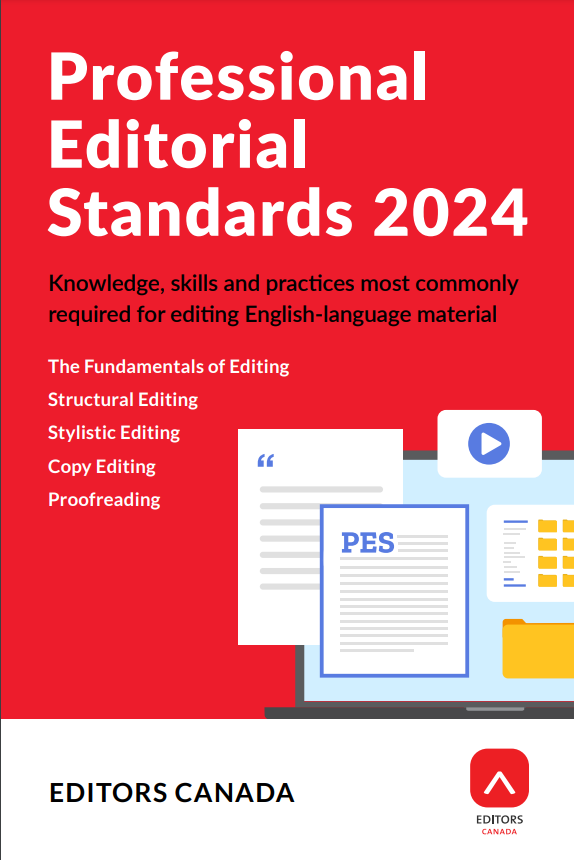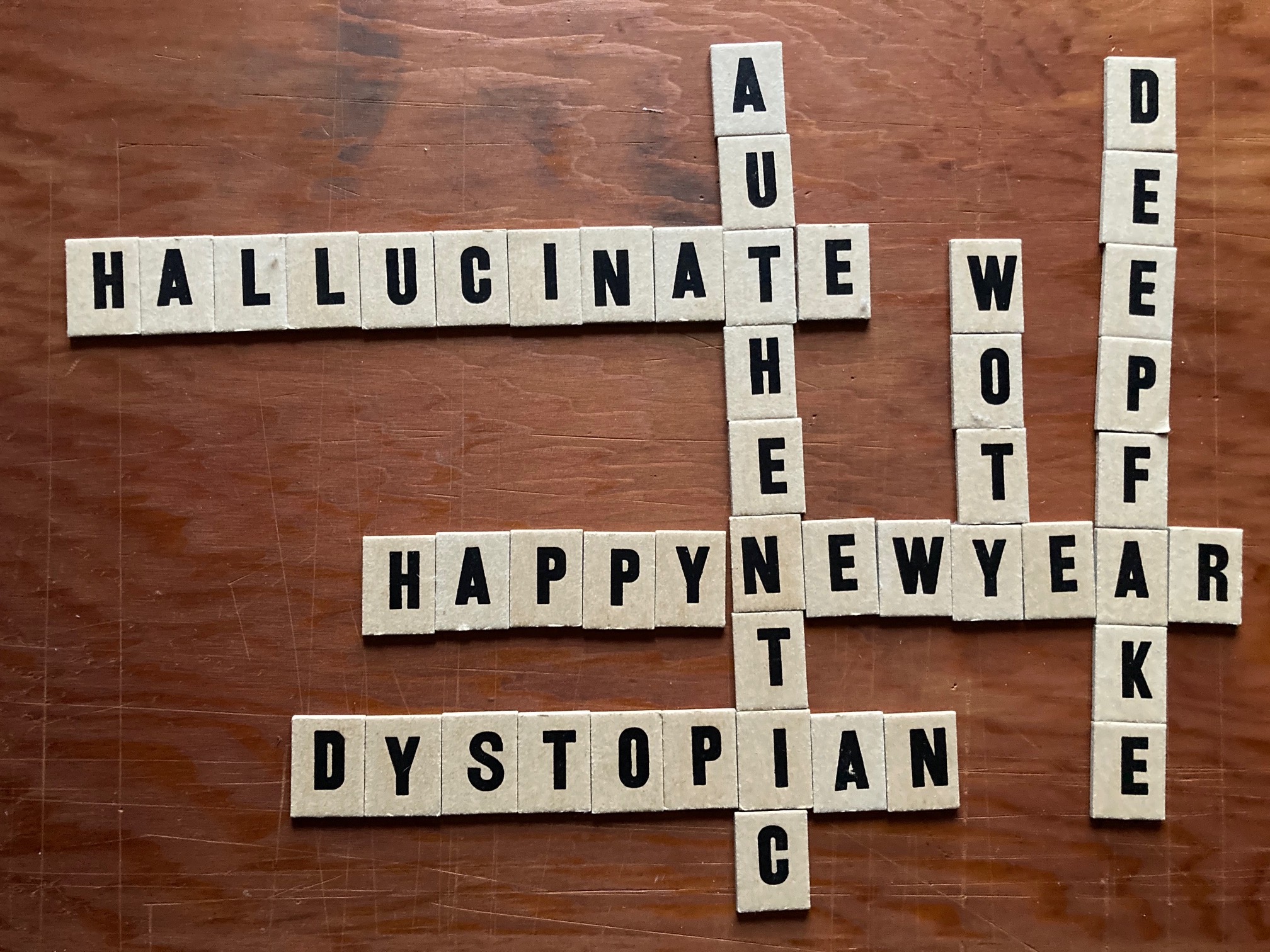Editors Canada's updated Professional Editorial Standards move our profession forward.
What’s the point of an editor?

The big question for many people working for the first time with an editor is, why? Why is this step needed? Why must I allow my finely honed work to be trod on by someone who’s not a subject matter expert or who doesn’t understand the delicate subtleties of my thinking?
Various fears—of being “corrected,” of seeing one’s carefully built structure chipped apart, of having one’s unique voice stifled by an insensitive nitpicker with a personal agenda—often leave a writer dubious about the value of being edited.
True, most people recognize that an editor will sweep for typos and muscle the grammar mop around. Alas, however, the full breadth and depth of what a professional editor brings to the table remains far from common knowledge. The Professional Editorial Standards, of Editors Canada, is helping get the word out. And many websites provide information that an editor can send to new clients to show the extent of what editors do (see, for example, the definitions of editorial skills of Editors Canada) and the specialized editorial skills used in particular subject areas and genres.
But, after years of experience in the editing and writing world, I’ve also adopted another way to help set the stage for a successful working relationship. This approach—as part of an informal introduction I send to a new client—aims at framing the bigger picture of the writer–editor relationship and getting away from talk of nits and personal agendas.
The gist of my pitch goes like this (tweaked as needed to suit the client or project):
- Please think of me as your ally, the person who has your back as you walk out into the world on these pages. This is your show, your TED Talk moment, your runway, and I’m here to help your appearance be memorable for all the right reasons and none of the wrong ones.
- I’m going to be your lighting and sound engineer, makeup artist, dresser, prompter, PR person, safety marshal, and more. I’ll do all I can to prevent unflattering lighting, screechy speaker feedback, a wardrobe malfunction, tripping hazards, and a bloated program that will lose the audience.
- If I suggest cuts to your content, it’s because I want to help you bring the high-grade material to the surface so it’s not buried in heaps of other information. Together we’ll mine, shape, grind, chisel, and polish your best content into idea and information gems that people will remember (again, for the right reasons and not the wrong ones).
- And if I say, “Not sure this is working [for this reason]; consider recasting”? That’s because, in my professional opinion, some of the content simply isn’t getting your meaning across clearly, making logical sense in the context, or fitting well now that other changes in the material have occurred. This is my nudge for a retake, asking you to rethink a piece and come at it from a fresh, new angle.
- Plus I’ll sweep for typos and swish the grammar mop about. It’s all part of the service.
For many new clients I’ve had, this kind of description is a game-changer in their understanding of the writer–editor relationship. They come to see that no better ally could they have than an editor who’s set on helping them succeed.
**********
A final note on recasting. With West Coast Editorial Associates marking its 25th anniversary this year, I’ve been thinking a lot about the group’s forging back in 1992. We’ve always been strong and unified, but it’s the occasional rethink—of structure, policies, partner makeup—that’s kept us that way.
As it happens, I’ll be doing some recasting of my own soon. On December 31, I’ll box up my editing and writing tools after 30+ years, 21 with WCEA. (Partner Louise Oborne will be doing the same. Two new talents, Barbara Johnston and Rowena Rae, have just entered the partnership.)
Between now and my sign-off I know that, like every writer advised to consider recasting, I’ll have moments of thinking, “But, but—it’s just fine the way it is! Why change a thing?” And then I’ll listen to that wise inner editor, my ally, who suggests there’s opportunity here for a fresh, new angle … and I’ll realize that this advice is exactly right.
This Post Has 15 Comments
Comments are closed.




A fine piece of communication. Just one thing missing . . . the author’s name and contact — in case I want to hire her.
I (Georgina Montgomery of WCEA) appreciate your note, Neall. Glad you enjoyed the post. And many thanks for bringing it to our attention that the author ID wasn’t appearing on the email notifications. We’ve got that technical glitch sorted out now for future posts.
Permission to link to this from my own website?
Thank you for your interest in this post, Jody. Yes, we’d be happy to have you link to the post on your website.
Excellent article, Georgina! May I add a link to it on my website?
I appreciate the good feedback, Dawn–thank you. And yes, we’d be delighted to have you link to the piece.
Will it be hard to retire? What will you do with your days?
Thanks for your interest in this post, Ellie.
Will it be hard to retire? In many ways, yes. I’ve loved this career hugely from the start, in the variety of subject areas, project types, and clients it’s brought to me for more than 30 years. I’ll miss giving all that up–and leaving a wonderful partnership. But “retiring” is a word I keep dodging in this decision. “Turning to other interests,” as cliched as it sounds, is how I look at this shift. If not now, then when?
What will I do with my days? Fill them as fully, actively, and purposefully as I do today, only not at my desk editing and writing. My growing list of new to-do’s is long and will likely need major whittling after a few months. At the moment, I’m somewhat fixated on Robert Bly’s lines: “Every noon as the clock hands arrive at twelve, I want to tie the two arms together, And walk out of the bank carrying time in bags.” Editor/writer turns to life of crime.
Well said Georgina! The blog is a terrific description of a good editor. I remember after leaving university, when you told me you were now an editor, I was bemused at how one could make a career (let alone a living) as an editor….. Well, you have shown me how! You were a great writer and presenter and you have obviously been a wonderful editor. Happy “next chapter” as a minor felon (love the Bly quote!)…..
Delighted to receive your good wishes, Susan. That makes at least TWO of us wondering back then about what I’d gotten into my head. Thanks to so many who took a chance on me–new clients and well-established editors and writers alike–that vague dream turned into an extremely gratifying pursuit.
I will miss working with you, Georgina! I always felt more assured putting work out knowing that you had given the copy a thorough review and edit. The newsletter project, that now seems in the distant past, would not have succeeded for 10+ years had it not been for your contribution. I’m so happy that you have time for other pursuits, and would love to connect for a celebratory drink!
Thank you, Farzana, for taking the time to comment. Thanks, too, for bringing me in to work on some memorable projects with you over the years. You were a wonderful client.
Georgina, it is with mixed emotions that I read this post. I am happy for you that you are moving on to the next act of your life but sorry for all of those who will miss having an amazing editor to work your magic on their works.
I have always said that a good editor makes your book better and a bad editor tries to make your book their book. You had the good editor part mastered to perfection. I was blessed when you came into my life and I will be forever grateful.
What a lovely note, Susan. Many thanks. I feel so fortunate to have worked with clients like you who always “got” the teamwork part (“Pitcher/Catcher” as you often referred to it) of the writer-editor relationship. I learned so much from working with you on your many non-fiction books. I’ll miss those collaborations, but will continue to cheer you on from the sidelines.
[…] myself, and ask them how they prefer to work. Electronic markup? Copious notes on hard copy? I let authors know what I’ll be doing, and I also ask what they expect from the process, what they want to achieve with their writing, […]